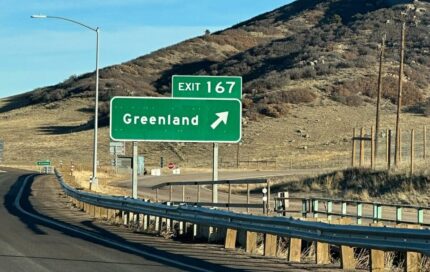Former President Donald Trump recently reignited discussions about purchasing Greenland, citing national security interests. However, for many, the Arctic’s vast mineral wealth and strategic position are the true allure. Despite these prospects, economic developments in the Arctic have significantly slowed, driven by geopolitical tensions and environmental challenges.
The Promise and Perils of the Arctic’s Riches
The Arctic’s region’s wealth of natural resources, including hydrocarbons, minerals, and fisheries, has long been seen as a potential economic boon. The so-called Arctic “cold rush” gained traction in 2008 when reports identified these resources as increasingly accessible due to melting ice caused by climate change. In addition, the reduction in ice has opened up new sea routes, with annual distances sailed by ships in the Arctic doubling between 2013 and 2023. These routes could provide shorter shipping passages between Asia, Europe, and the U.S., enhancing global trade efficiency.
However, the challenges of Arctic operations remain severe. Norwegian fisherman Sondre Alnes-Bonesmo, who works aboard the Granit trawler, illustrates the difficulties. He endures months of darkness, freezing temperatures below -40°C, and massive storms while fishing in Arctic waters. Despite these hardships, he acknowledges the opportunities presented by the Arctic’s resources but questions whether these opportunities are already diminishing.
Geopolitical Tensions Freeze Arctic Investments
Russia’s invasion of Ukraine in 2022 has significantly impacted Arctic’s economic activities. Once ambitious Arctic plans, including Russia’s construction of regional rescue centers and shipping lanes through the Northeast Passage, have largely ceased. Norwegian firms have also halted oil and gas exploration in the Barents Sea, reflecting a broader withdrawal from Arctic projects.
Morten Mejlaender-Larsen, Arctic’s operation director at Norwegian firm DNV, highlights that poor international relations and the high risks of Arctic operations have discouraged further investments. While some Chinese ships continue to navigate the Northeast Passage, the route’s economic viability has diminished, alongside the waning interest of Western nations.
The Environmental and Economic Reality Check
Environmental concerns and operational risks in the Arctic have tempered earlier excitement about its potential. Greenpeace lauded Norway’s recent decision to halt deep-sea mining licenses in Arctic waters, underscoring fears about the fragile ecosystem. Experts, including Helene Tofte from the Norwegian Shipowners Association, stress the logistical and financial challenges of operating in the Arctic. Extreme weather, inadequate emergency response capabilities, and a short operational season limit the region’s appeal for commercial ventures.
Moreover, Prof. Arild Moe of the Fridtjof Nansen Institute argues that earlier resource assessments were overly optimistic. He explains that many estimates were based on speculative and uncertain projections, making exploitation risky and expensive. With geopolitical challenges and environmental concerns mounting, the Arctic’s allure as an economic frontier has waned, leaving its development largely frozen, despite Trump’s renewed interest in Greenland.
Trump’s Renewed Interest in Greenland: Security, Resources, and Diplomatic Fallout
Former U.S. President Donald Trump’s revived interest in purchasing Greenland, an autonomous territory of Denmark, has reignited a diplomatic standoff between the U.S., Greenland, and Denmark. Greenlandic and Danish authorities quickly dismissed the idea, emphasizing once again that the island is “not for sale.” Trump’s comments were labeled as “crude and undiplomatic” by Professor Moe, an expert on Arctic’s geopolitics, who pointed out that the U.S.’s interest in Greenland reflects its strategic focus on both security and economic opportunities.
Greenland’s vast mineral resources and strategic location have made it a focal point of international attention. In response to renewed U.S. interest, the Danish government announced a significant increase in defense spending for Greenland, signaling its commitment to protecting the territory’s sovereignty. This move highlights Denmark’s effort to secure its Arctic interests amid growing geopolitical competition in the region.
Arctic’s Resource Race: U.S. and Canada’s Strategies
Beyond Greenland, Trump’s Arctic agenda has also spotlighted Alaska’s oil and gas potential. The Arctic National Wildlife Refuge (ANWR), a 19-million-acre expanse and the largest wildlife refuge in the U.S., is at the center of these plans. In 2020, Trump authorized drilling in a section of ANWR, and current U.S. policies suggest further exploration may be permitted, sparking environmental concerns.
Meanwhile, Canada has been advancing its Arctic strategy with the construction of a deep-water port at Grays Bay, located in Nunavut, its northernmost territory. Situated along the Northwest Passage, this project underscores Canada’s determination to enhance its Arctic infrastructure and assert its sovereignty in the region. As global warming makes the Arctic more accessible, countries are vying for control of its untapped resources and strategic waterways, intensifying the competition for dominance in the High North.
Arctic Voices: Balancing Economics and Environment
In Norwegian Arctic waters, fishermen like Mr. Alnes-Bonesmo are witnessing the challenges of maintaining a balance between economic sustainability and environmental conservation. While he acknowledges earning a good income from fishing, he notes that quotas are consistently reduced to preserve fish stocks. Reflecting on his experiences, he describes a deep respect for the Arctic Ocean’s power and beauty, emphasizing the need for careful stewardship in this fragile ecosystem.
As the Arctic becomes a key battleground for geopolitical and economic interests, the region’s future will depend on international cooperation and sustainable practices. The renewed focus on Greenland and the broader Arctic underscores the complex interplay of national security, resource exploitation, and environmental preservation in one of the world’s most vulnerable areas.














